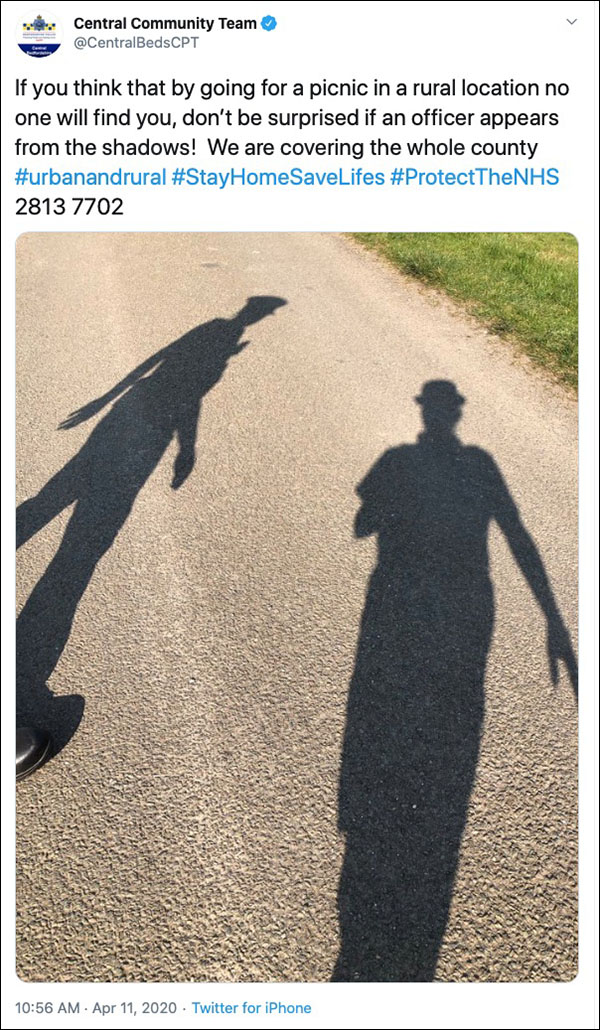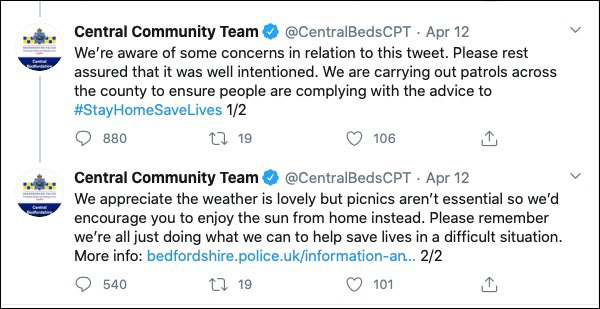COVID FOUR YEARS AGO TODAY:

As Ross Douthat wrote in the New York Times a few days later in 2020: When Coronavirus Lockdowns Go Too Far. The closures were necessary. Chasing picnickers and closing paint aisles is petty overreach.
The tweet shows two silhouettes, extending in familiar policeman shapes. The text is as cheery as a beat-walking bobby in an Edwardian children’s book: “If you think that by going for a picnic in a rural location no one will find you, don’t be surprised if an officer appears from the shadows!” And the message, directed in this case to the inhabitants of Central Bedfordshire in England, is an example of how even when they’re essential, anti-pandemic policies are always at risk of going a little bit insane.
I’m a skeptic, to put it mildly, of the skeptics of lockdowns and social distancing requirements. At best they make an argument for more speed and optimism in reopening*, not a case that there’s an alternative world where the American economy stayed open** and steady while the virus was killing more people weekly than car crashes, flu or cancer and New York’s monthly death toll was climbing above that of September 2001***.
But the skeptics’ determination to catalog every petty tyranny inflicted in the name of quarantine is an important public service — not just because overreach always needs critics, but because petty tyrannies today are obstacles to the adaptation we need to get to semi-normalcy tomorrow.
In response to the overreach of the Central Bedfordshire rozzers, James Lileks noted:
If you sneak off into the woods for a picnic, you could be killing people and crippling the NHS, so shadowy peelers should manifest themselves and issue tickets.
Turns out this wasn’t well received:
Utter nonsense. Huge stonking heaps of bollocks. Walking to the dunes for a picnic, or heading to the field off Potter’s Lane to enjoy the sun, is absolutely harmless, and everyone knows it, and it’s corrupting the trust people would normally grant the authorities. As I once wrote about small-minded public officials: “I don’t make the laws, sir, I just enforce them with a great deal of enthusiasm.”
Back in 2018, when British cops were threatening social media critics after the NHS banished 23-month-old Alfie Evans to the Spartan hillside, British ex-pat Charles Cooke tweeted, “Michael Brendan Dougherty pointed out to me that police in the U.K. spend all their time on Twitter threatening people with jail time for frivolous things, and now I can’t stop seeing it.” The lockdowns gave the British police all the excuse they needed to get their inner Mosley on.
* In retrospect, Sweden would like a word here.
** As John Hinderaker wrote at Power Line a couple of weeks ago, “The New York Times looks back on covid, four years down the road, and says ‘Here’s what we’ve learned.’ I would say we have learned some things that the Times doesn’t touch, like the idiocy of shutting down stores, businesses, churches and, especially, schools.”
*** New York Times quietly admits COVID deaths were overcounted by ‘almost one-third.’

